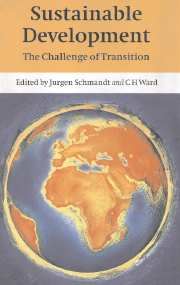Book contents
- Frontmatter
- Contents
- List of contributors
- Foreword
- Preface
- 1 Challenge and response
- 2 National self-interest in the pursuit of sustainable development
- 3 Uneconomic growth: Empty-world versus full-world economics
- 4 Population and consumption: From more to enough
- 5 Spirituality and sustainability
- 6 Leadership skills for sustainable development
- 7 The role of science: Guidance and service
- 8 Economic tools, international trade, and the role of business
- 9 Stakeholders and sustainable development
- 10 From idea to action: The role of policy
- Index
2 - National self-interest in the pursuit of sustainable development
Published online by Cambridge University Press: 17 August 2009
- Frontmatter
- Contents
- List of contributors
- Foreword
- Preface
- 1 Challenge and response
- 2 National self-interest in the pursuit of sustainable development
- 3 Uneconomic growth: Empty-world versus full-world economics
- 4 Population and consumption: From more to enough
- 5 Spirituality and sustainability
- 6 Leadership skills for sustainable development
- 7 The role of science: Guidance and service
- 8 Economic tools, international trade, and the role of business
- 9 Stakeholders and sustainable development
- 10 From idea to action: The role of policy
- Index
Summary
There is no universally accepted definition of sustainable development, nor do all definitions of sustainable development yield practical guidelines for policymakers. The concept is perhaps best defined as development that maximizes the long-term net benefits to humankind, taking into account the costs of environmental degradation. Net benefits include not merely income gains and reduced unemployment and poverty, but also healthier living conditions and other benefits associated with improved environmental quality. Interpreted this way, sustainable development stresses not the need to limit economic growth, as some have argued (e.g., Daly 1991), but rather the need to grow and develop sensibly, to ensure that the benefits of development are long-lasting: that in the most general sense, people become better off over time.
Sustainable development represents an attempt to make conservation the handmaiden of development, while protecting the interests of future generations. Pragmatic concepts of sustainable development value environmental protection not for its own sake, but for its contribution to the welfare of present and future generations. A sustainable development strategy thus permits the providential depletion of natural resources and the intelligent utilization of the environment's waste assimilation services. One key condition for achieving sustainability is that natural resources and environmental services not be undervalued or underpriced – a condition that is frequently violated in practice, as we shall see.
International meetings have tended to emphasize a global perspective on sustainable development. Most notable in this regard is the 1992 “Earth Summit” (officially, the U.N. Conference on Environment and Development) in Rio de Janeiro.
- Type
- Chapter
- Information
- Sustainable DevelopmentThe Challenge of Transition, pp. 11 - 62Publisher: Cambridge University PressPrint publication year: 2000
- 2
- Cited by

